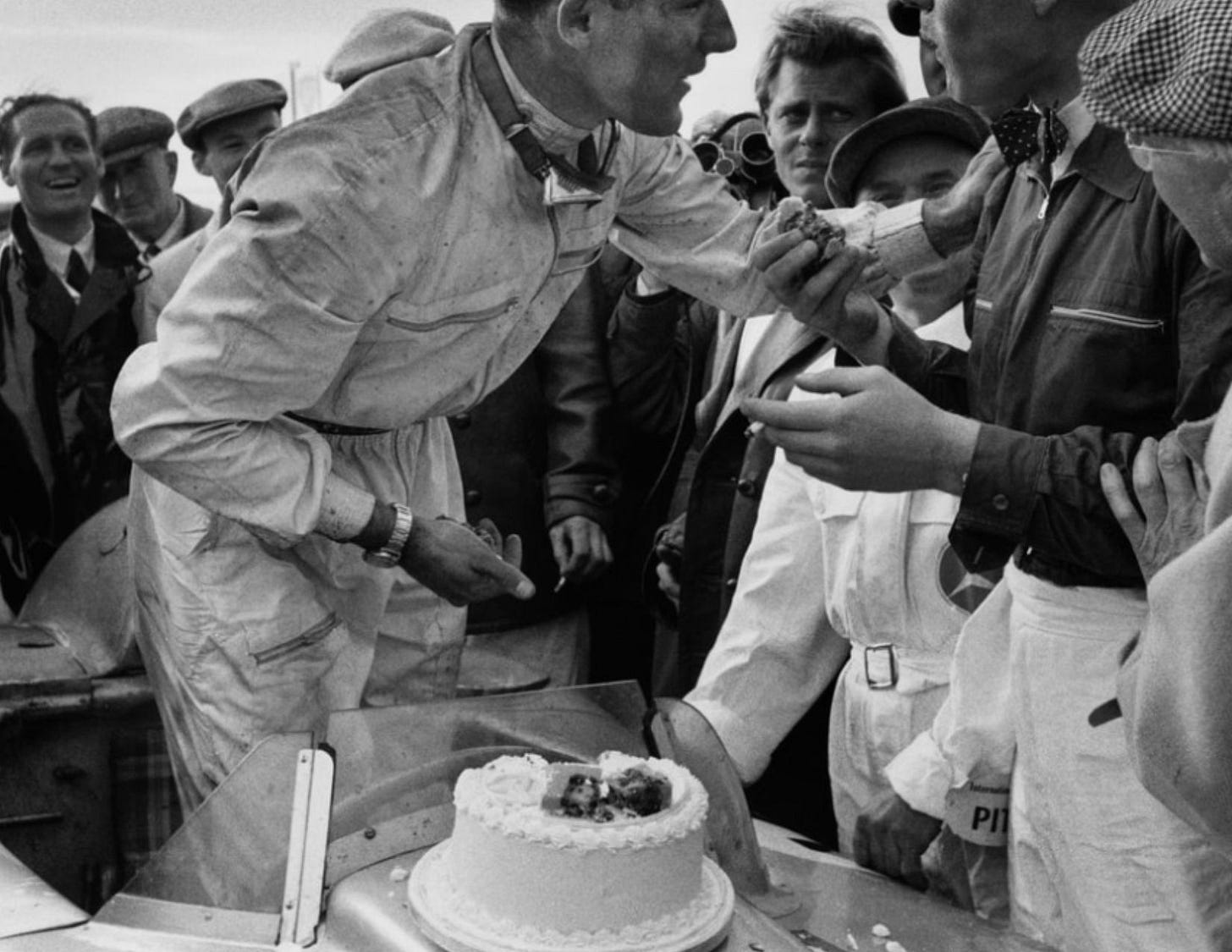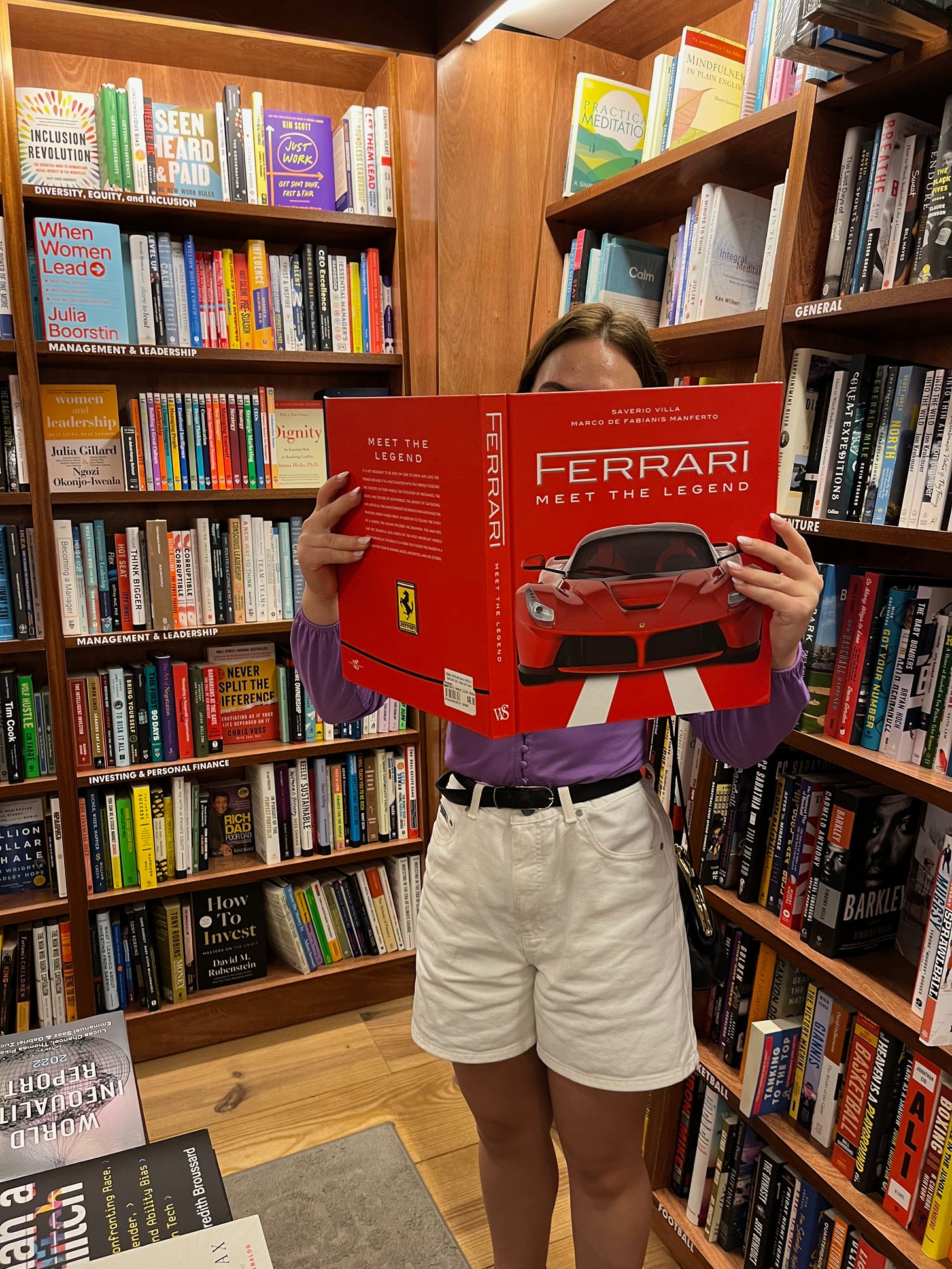One Year of Formula Flash
How Substack launched my career in motorsport and brought me back to journalism

I watched the Australian Grand Prix from a bar on the Upper East Side in the early hours of Sunday. As the lights went out exactly as the clock struck midnight, I got a bit sentimental — and not just because a few celebratory drinks tend to make me weepy. Surrounded by friends I hadn’t seen in seven months on the eve of the one-year anniversary since I started writing about the sport on Substack, I’m surprised I wasn’t crumpled up, sobbing on the sticky floor.
In lieu of a race play-by-play or detailing the intricacies of whether Max Verstappen's premature trip to the garages was enough to boost the morale of an entire sports franchise, I thought we could get soppy together.
I wish I could say I was born into the world of motorsport; that a team inheritance was my birthright or that I had a father who drank whole milk on the top step at the Indy 500.
But instead, my sudden love affair with racing was a shock to practically everyone around me — including myself. Looking back, it shouldn't have been. I had too many questions about the mystique of motorsport that demanded answers.
I’ve always tended to charge like a bull towards any subject that waves its red flag in my direction. At 11, it was the sabermetrics behind baseball and watching “Moneyball” at least once a week. At 13, it was Watergate with a little bit of One Direction mixed in there. At age 15, it was professional skateboarding and South Africa’s political system. At 17, it was Mexico’s economic structure.
All along it’s been narcotics trafficking and reading up on just about anything that involves money laundering.
Formula 1 was founded on closed-door deals headed by a former used-car salesman turned billionaire. As journalists Joshua Robinson and Jonathan Clegg pointed out in their new book “The Formula,” Bernie Ecclestone essentially created a racing cartel when he organized all ten teams under the Formula One Constructors’ Association. Starting out selling marked-up candy on the school playground, he went on to own the entire $17.1 billion sport as CEO of the Formula One Group.
“What the teams needed was to work together, controlling the terms and negotiating as one,” wrote Robinson and Clegg. “They could be a cartel if they wanted — they just didn’t know it yet.”
So, it’s no real surprise I was infatuated with Formula 1 in the end.
Despite growing up 30 miles away from the Iowa Speedway, it took traveling 4,133 miles to fall in love with racing during a post-graduate publishing course in Oxford. After a botched book publishing career and a move to New York City, motorsport (and the very dear friends who introduced me to it) was the only thing that survived my buttoned-up time at Exeter College.
I flew to England hoping to build a life-long career as a book editor. I ended up on a race track eight months later.
Formula Flash began exactly a year ago. It was a Saturday and I was crammed into my first Brooklyn apartment bedroom with no windows. Typing out a story about Mercedes’ impending downfall was like letting fresh air flow into the stuffy eight-by-ten-foot room.
I had started a career I thought I wanted; I received a job at a top publishing company that most of my peers would kill for and I was living in a city that every postcard deemed the greatest on earth. I transitioned to book publishing after graduating from college as quickly as I could. Three years of writing about sinking cities and dwindling resources later, I left with a degree in environmental journalism, a case of burnout and no desire to start a newsroom job.
But in that dollhouse of an apartment in a city that felt so bloated and bustling with people, my thoughts about the sport swelled to a point that I had to write the words down or they’d consume me whole.
Motorsport quickly became my escape. It brought me back to journalism and pushed me to leave both my nine-to-five and New York to freelance full-time.
Whether it's the mafia madness or the remnants of yesterday’s pub-hopping talking, most days I feel like Tony Soprano. But instead of the mob, I’ve missed the golden age of sports journalism.
It’s an understatement to say that it’s not the best time to enter sports journalism. The industry isn’t exactly booming. Rather, once highly-regarded publications are clearing out their offices and some of the top newspapers are slashing their sports desks. Sports journalism isn’t the lead-chasing mad dash that the news veterans of yesterday were well practiced in. It’s not rare for an influencer to sidle up to you in the media pen and, on more than one occasion, athletes have offered to conduct an interview over a voice memo text chain rather than pick up the phone for a quick call.
With sports publications strapped for cash, sponsor-funded trips to the race track have not just become common but expected. Peeking behind the sport’s heavily guarded curtain is strongly discouraged. Journalistic integrity and accountability are too often sacrificed as a result.
“It’s just motorsport,” you might say to yourself. But as Keith O’Brien wrote for The Atlantic, you’ll miss sports journalism when it's gone. Turning a blind eye to sports’ impact on the world around us, from stadiums depleting neighborhood tax bases to athletes advising elected officials, doesn’t prevent misconduct from occurring.
It also doesn’t stop the people who run plays from running the world.
Sports teams may not have offices on Wall Street, but banking’s “Big Four” are scrambling to set up dedicated sports investment floors. And surely sports isn’t as serious as politics, right? But then there is former NASCAR driver Austin Theriault who is running in the 2024 Republican primary for Maine’s House of Representatives. Theriault’s fellow stock car driver Hermie Sadler is running for Virginia’s state senate seat.
If athletes aren’t actively running for office, many have deep pockets in diplomacy.
Haas only unseated Russian driver Nikita Mazepin and refused sponsorship money from his father, a close ally of President Vladimir Putin, when the European Union stepped in following Russia’s invasion of Ukraine. Last year, former three-time Formula One Drivers’ World Champion Nelson Piquet was accused of holding Brazilian President Jair Bolsonaro’s high-value belongings the latter refused to hand over to authorities. Bolsonaro, a far-right populist, is expected to be indicted for a series of scandals throughout his term: from alleged mafia ties and money laundering to an attempted military coup and forged vaccination documents.
The sport has aimed to fracture political connections in recent years. The Fédération Internationale de l'Automobile’s (FIA) 2022 regulation banning drivers from making political statements — shortly after Sebastian Vettel and Lewis Hamilton publicly called for justice in George Floyd and Breonna Taylor’s deaths and several other drivers took a knee ahead of the Bahrain Grand Prix — only created a false sense of sport and state separation.
While Formula 1 team principals Toto Wolff and Christian Horner make reportedly north of $10 million per year and the sport’s ruling body is slammed with transparency complaints, a skeptical media is needed more than ever.
I remain cynical about the future of sports journalism and my place in it, all while likely being naive beyond repair.
When I do doubt myself and question if I should have just stayed at my desk job, I think about going into the empty office on Fridays to package books, but mostly to watch free practice sessions. Even before I was working in motorsport, my life seemed to orbit around it.
I’m reminded by the readers who keep coming back and the little signs I choose to give meaning to that it was the right choice after all. Like when I stepped into a quaint taco shop on the first night of a trip to Mexico. As I ate, a 20-minute special on Extreme E, which I had just reported on in Chile, popped onto the TV.
Substack has given me more in return than I ever anticipated: It launched my career. It led me to ride shotgun in a rally safety car, pirouetting around the mountains straddling Monaco, France and Italy, where a former French karter turned social media editor brushed up on his rusty reaction times behind the wheel and a motorsport executive, sitting in the backseat, spewed his breakfast on the side of a nondescript dirt road. It brought me back to my home state’s corn fields to watch IndyCar drivers turn left for 200 laps. It has led me to have good interviews — typically where I’m not looking (i.e. with mechanics and security guards) — and a handful of bad ones.
In other words, I owe Substack and, more importantly, the people who continue to read Formula Flash a lot.
Thank you for your continued support.
Gratefully,
Olivia




Congratulations! I link to Formula Flash articles pretty consistently these days in News Racers Can Use on Motorsport Prospects. Hopefully we will run into each other at a track some day.
Your sharing of your personal connection fuels the excitement to read the next flash, especially for readers like me who are total novices to the sport. Congrats on being brilliant you; a great writer and visionary